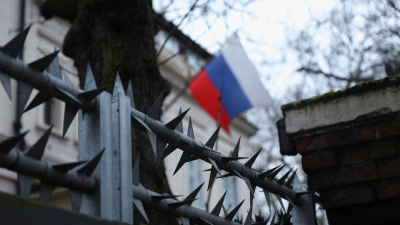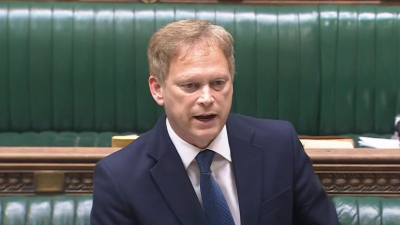UK Fighter Jets Intercept Iranian Drones in Unprecedented Attack on Israel
Rishi Sunak, the Chancellor of the Exchequer, disclosed that British jets successfully downed "a number of drones" launched by Iran during its brazen assault on Israel overnight. Describing Tehran's actions as a "dangerous and unnecessary escalation," Prime Minister Boris Johnson emphasized the potential catastrophic consequences for regional stability if the attack had not been thwarted.
According to Israeli authorities, Iran unleashed a barrage of 170 drones, over 30 cruise missiles, and at least 120 ballistic missiles in the assault, triggering air raid sirens across the nation. Providing insights into the international response, Sunak commended the coordinated efforts that led to the interception of the majority of the missiles, averting casualties not only in Israel but also in neighboring countries like Jordan.
Acknowledging the UK's contribution, Sunak confirmed the deployment of "additional planes" to the region as part of ongoing operations in Iraq and Syria. "I can confirm that our planes did shoot down a number of Iranian attack drones," he affirmed.
As tensions escalate, the Ministry of Defence (MoD) revealed the dispatch of RAF jets and air refueling tankers to reinforce "Operation Shader," the UK's counter-Islamic State initiative in the region. However, Minister of State for Safeguarding Victoria Atkins refrained from confirming or denying the interception of drones during her media appearances.
Anticipating further developments, Sunak is set to join US President Joe Biden in a call with G7 leaders to address concerns about potential escalation and discuss strategies to mitigate the situation. In response to calls for action, Labour has urged the government to impose "further sanctions" on drone technology, with Shadow Foreign Secretary David Lammy expressing particular concern over the use of the Shahed 136 drone, which Iran has also supplied to Russia.
Calls for Heightened Sanctions on Drones Amid Escalating Tensions Between Iran and Israel
Expressing urgency, Rishi Sunak emphasized the need for increased sanctions on drones, urging the government to unveil comprehensive plans in this regard. The statement comes in the wake of an assault launched by Iran, purportedly in retaliation for an airstrike attributed to Israel on an Iranian consular building in Syria, resulting in the deaths of two Iranian generals.
This marked the first instance of Tehran directly engaging in military action against Israel, a culmination of decades-long hostilities dating back to Iran's 1979 Islamic Revolution. The situation poses a significant risk of regional escalation, particularly as it unfolds amidst heightened tensions fueled by the conflict in Gaza, reigniting long-standing animosities in the Middle East.
While the UK and the US have reiterated their unwavering support for Israel, Tehran has issued veiled threats of a more forceful response should Washington participate in any future military endeavors. Israeli military spokesperson Rear Admiral Daniel Hagari provided reassurance, stating that the vast majority of the over 300 drones, cruise missiles, and ballistic missiles launched were intercepted before reaching Israeli territory. He noted only one reported casualty, a seven-year-old severely injured by shrapnel.
As the situation evolves, there are growing concerns about the potential ramifications of continued aggression. The development underscores the pressing need for diplomatic efforts to de-escalate tensions and prevent further violence in the region.
In conclusion, as tensions between Iran and Israel continue to escalate, the urgent call for heightened sanctions on drones reflects the gravity of the situation. With both sides engaging in military actions and issuing warnings of potential retaliation, the risk of further escalation remains high. The international community, including the UK and the US, must prioritize diplomatic efforts to defuse tensions and prevent the situation from spiraling into a full-blown conflict. As the world watches closely, the need for measured responses and constructive dialogue becomes increasingly paramount in safeguarding regional stability and averting a humanitarian crisis.







